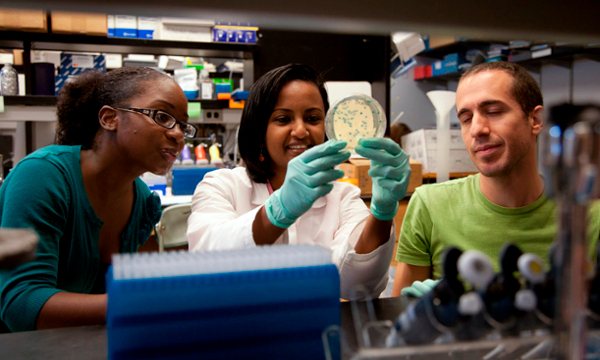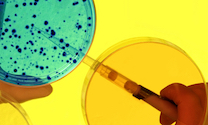Program Curriculum
The graduate experience in MMG begins with an introduction to the faculty and their research through a series of short talks known as the Introduction to Faculty Research series. Students then choose the first of three research rotations, which are designed to provide exposure to different areas and to varied techniques, and to enable the student to choose a laboratory for thesis research. These rotations proceed one at a time beginning early in the fall semester and concluding late in the spring semester. Typically, students affiliate with a home lab and mentor by the end of the spring semester of their first year.
In addition to laboratory rotations, first year students also complete the core courses below.
IBS 504: Introduction to Prokaryotic Genetics - Dr. Charles Moran and Dr. Philip Rather
This is an introductory course in bacterial genetics for students who have had, or are currently taking, Biochemistry. It is designed to help students make the transition between large lecture courses and independent creative scientific thought. It also emphasizes oral communication. In the first third of the course, students are introduced to the basic terms and concepts in molecular genetics of bacteria and their viruses, including the mechanisms of genetic exchange and regulation of gene expression. The following segments of the course are devoted to reading and interpreting original papers in the field, both classical and contemporary. In discussion format, the students are encouraged to question conclusions in the papers and to design experiments to test "facts". Small sessions (voluntary) explain and discuss techniques in molecular biology and genetics applied to bacteria.In addition to the Course Director, Drs. Moran and Rather actively participate in the course.
IBS 513: Graduate Virology - Dr. David Steinhauer and Dr. Anice Lowen
A sound fundamental knowledge of molecular biology, biochemistry, and cell biology are recommended prerequisites. The course is taught in Spring, so most first year students will be prepared if they have taken Biochemistry in the previous Fall semester.The graduate virology course is designed to provide a strong background in the basic concepts involving viral replication, pathogenesis, and immunity. This is an interactive course in which several MMG and IMP faculty members are active participants. The first half of the course focuses on concepts that are applicable to viruses in general, and includes classes that cover virus structure, host cell entry, RNA virus transcription and replication, DNA virus transcription and replication, Retroviruses and retroviral integration, processing and translation of viral RNAs, virus assembly and exit, chronic infections, viral pathogenesis, viral immunity, and immune evasion. The second half of the course concentrates on specific virus families with an emphasis on human pathogens. In this half of the course faculty members generally lecture on the viruses that their individual research programs are focused on. In addition to the Course Directors, Professors Speck, Hunter, Spearman, Weiss, Jacob, Moore, Anderson, Derdeyn, Grakoui, Mocarski, and Steel are actively involved in the course, and several guest lecturers from the CDC participate as well.
MMG 792r: Colloquium - MMG Program Faculty
This course instructs first and second year MMG students in the organization and presentation of research endeavors. Students are trained in computer programs for figure and slide preparation and use of photo documentation systems. Presentations of journal articles and personal research in progress are evaluated by both attending students and the faculty organizers.IBS 545r: Introduction to Research - MMG Program Faculty
This course familiarizes entering students with the research programs of the MMG faculty and facilitates the choice of laboratory rotations. Teaches research interests, methods and procedures for genetics, immunology and virology. Emphasis is placed by the faculty on the research and laboratory techniques applicable to respective research areas.MMG 570r: Introductory Graduate Seminar
The seminar consists of presentation and critical evaluation of scientific material which can be obtained from a variety of sources including contemporary scientific literature. The course is designed to teach students how to analyze and interpret data, and importantly, to prepare and deliver oral presentations. After a student advances to candidacy, he or she may elect to take this course on a satisfactory/ unsatisfactory basis. Advanced students will, in general, present material relevant to his/her thesis project.MMG 597r: Lab Rotations - MMG Program Faculty
In consultation with the Director of Graduate Studies, first year students select one of the following courses:
IBS 555: Basic Biological and Biomedical Sciences I - Dr. Doug Falls & MMG Faculty
The IBS 555/556 sequence is intended to catalyze students’ efforts to build the strong foundation required to effectively conduct primary research in the biomedical and biological sciences. Emphases include: (a) comprehending major concepts and vocabulary of modern biomedical sciences, (b) developing skills to critically read scientific literature and evaluate data, and (c) understanding core methodologies used to address fundamental questions about macromolecules and complex processes in cells and organisms. Disciplines considered include: Biochemistry, Structural Biology, Cell Biology, Development, Genetics, Molecular Biology, and Cell Physiology. The connections between these disciplines will be stressed. One goal is to integrate concepts with the experimental foundations on which they are based; thus approximately 10-20% of the lecture content will focus on methodologies. Class sessions (1 h 45 min) will be held four days a week. The format for most classes will be lectures by faculty, with student questions and discussion encouraged. Examination questions will derive from both class content and assigned readings.
IBS 542: Concepts of Immunology - Dr. Haydn Kissick and Dr. Steve Bosinger
The purpose of this course is to supply a fundamental and comprehensive presentation of the essential concepts in Immunology. It is designed to prepare students for advanced study and research in Immunology. In addition to descriptions of immunological concepts and terminology, emphasis will be placed on experimental approach. Students should begin to become aware of "state of the art" technology and current direction of Immunological research.
The following courses (or their equivalents) are required of all students in the Microbiology and Molecular Genetics Program:
| COURSE # | COURSE TITLE | CREDITS |
|---|---|---|
IBS 504 | Introduction to Prokaryotic Genetics | 6 |
*IBS 555 or IBS 542 | Principles of Basic Biomedical & Biological Science Concepts of Immunology | 6 4 |
MMG 570r | Introductory Graduate Seminar | 1 |
MMG 597r | Laboratory Rotations | 1 |
MMG 792r | Colloquium in Microbiology | 1 |
| COURSE # | COURSE TITLE | CREDITS |
|---|---|---|
IBS 513 | Virology | 5 |
MMG 570r | Introductory Graduate Seminar | 1 |
MMG 792r | Colloquium in Microbiology | 1 |
MMG 597r | Laboratory Rotations | 1 |
Choose one additional course from the Elective Course list, or register for IBS 538 "Stat Design and Analysis of Experiments". Students must take IBS >538 in either spring of Year 1 or spring of Year 2.
| COURSE # | COURSE TITLE | CREDITS |
|---|---|---|
MMG 790r | Advanced Graduate Seminar | 1 |
MMG 792r | Colloquium in Microbiology | 1 |
IBS 522r | Hypothesis Design & Scientific Writing | 4 |
IBS 699r | Advanced Graduate Research | credit hours vary |
Choose one additional course from the Elective Course list.
| COURSE # | COURSE TITLE | CREDITS |
|---|---|---|
MMG 790r | Advanced Graduate Seminar | 1 |
MMG 792r | Colloquium in Microbiology | 1 |
IBS 699r | Advanced Graduate Research | credit hours vary |
Choose one additional course from the Elective Course list or register for IBS 538 if not yet taken.
Students will take 2 elective courses in the first two years as well as IBS 538 "Stat Design and Analysis of Experiments". They have a choice over whether they complete IBS 538 in the first spring semester or second spring semester depending on when other elective courses are offered. Students may choose to take additional electives after the first two years in consultation with their mentor and the Director of Graduate Studies. Below is a sampling of electives MMG students have taken in the past. Students should contact the Program Administrator for more information on electives currently available.
| COURSE # | COURSE TITLE | CREDITS | SEMESTER OFFERED |
|---|---|---|---|
| IBS 515r | Current Topics in Molecular Genetics | 4 | Fall |
| IBS 542 | Concepts of Immunology | 4 | Fall |
| IBS 556 | Principles of Basic Biomedical and Biological Sciences II | 6 | Spring |
| IBS 560 | Model Genetic Systems | 4 | Fall |
| IBS 568 | Principles of Anti-infectives | 4 | Fall |
| IBS 725 | Prokaryotic Gene Expression | 6 | Spring |
| IBS 727 | Genetics of Bacterial Pathogenicity | 6 | Spring (every 3 years) |
| IBS 742 | Regulation of Cell Growth | 6 | Spring (every 3 years) |
| IBS 777r | Annual Reviews of Immunology | 2 | Fall |
| MMG 797r | Directed Study | VC | Fall & Spring |





